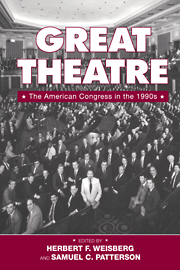Book contents
- Frontmatter
- Contents
- Figures and Tables
- Preface
- Contributors
- Introduction
- Congress and Its Audience
- Congress at Play
- Congress and Other Actors
- 8 The Plot Thickens: Congress and the President
- 9 Congress and the Courts: A Case of Casting
- 10 Behind the Scenes: The Supreme Court and Congress in Statutory Interpretation
- 11 Congress and Foreign Policy: A Neglected Stage
- Conclusion
- References
- Index
11 - Congress and Foreign Policy: A Neglected Stage
Published online by Cambridge University Press: 20 January 2010
- Frontmatter
- Contents
- Figures and Tables
- Preface
- Contributors
- Introduction
- Congress and Its Audience
- Congress at Play
- Congress and Other Actors
- 8 The Plot Thickens: Congress and the President
- 9 Congress and the Courts: A Case of Casting
- 10 Behind the Scenes: The Supreme Court and Congress in Statutory Interpretation
- 11 Congress and Foreign Policy: A Neglected Stage
- Conclusion
- References
- Index
Summary
A special stage for the presentation of governmental theatre involves foreign policy. However, scholars have paid only modest attention to the role that Congress plays in this continuing drama. Much of the discussion of the topic that does exist revolves around normative arguments about the “proper role” of Congress – usually as contrasted to the role of the president. General empirically-based conclusions are scarce and attention to change in behavior over time has been inadequate. This chapter examines congressional foreign policy behavior empirically. After briefly summarizing salient aspects of the general context for congressional action and the influence of Congress from 1945 to 1989, the remainder of the chapter analyzes the role Congress has played in the post–Cold War era. In paying particular attention to the 104th Congress, the chapter examines the effects of the new Republican control of Congress and also comments on the link of foreign policy behavior to the election cycle.
Many aspects of congressional–presidential disputes over the substance of foreign policy in the 104th Congress resemble other periods of divided government since World War II. However, careful examination of the 104th Congress reveals great similarity between the partisan political treatment of foreign policy and the partisan political treatment of domestic policy. Congressional Republicans used foreign policy in about the same way they used domestic policy to discredit a Democratic president seeking reelection. In 1995–6, neither Congress nor the president showed more than fleeting interest in grappling seriously with the foreign policy implications of the end of the Cold War.
- Type
- Chapter
- Information
- Great TheatreThe American Congress in the 1990s, pp. 248 - 268Publisher: Cambridge University PressPrint publication year: 1998
- 10
- Cited by



